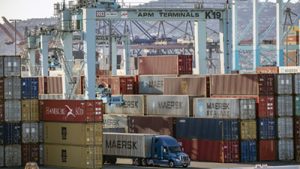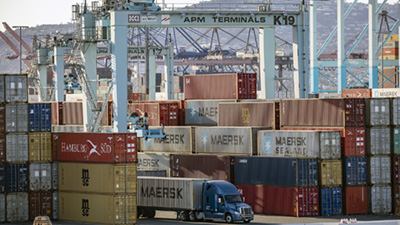
The amount of time an import stays on the docks at the San Pedro Bay ports before leaving by truck increased in November, according to new data from the Pacific Merchant Shipping Association.
The average dwell time for containers leaving terminals by trucks last month was 8.37 days, notably higher than October’s 7.64-day average.
Meanwhile, the average dwell time for containers leaving the ports by rail fared better last month, with dwell times improving from an average of 3.9 days in October to 3.5 days in November, according to PMSA data.
“The pandemic-related surge continues, the overall supply chain remains congested, and local container dwell time continues to be high,” said Jessica Alvarenga, PMSA’s manager of government affairs. “Marine terminal operators have opened additional gate hours and leased extra space to place additional containers; however, live gate cameras show these extended hours remain underutilized. It is vital for cargo owners to pick up their cargo in a timely manner.”
The ports of Los Angeles and Long Beach have been working to troubleshoot the congestion brought on by record cargo volumes. In October, both ports announced plans to implement a “Container Dwell Fee” in which ocean carriers would be charged $100 for every import that stays nine or more days before leaving by truck and six or more days before leaving by rail. An incremental charge of $100 per container also would be issued daily until the import is removed from a terminal.
Both ports said they’ve been seeing the amount of cargo lingering at terminals drop consistently since the October announcement, most recently by an estimated 35%, prompting them in the last few weeks to delay enacting the fee based on the data they’re monitoring weekly. Both ports have delayed fee implementation to Jan. 10.
Meanwhile, the Port of Los Angeles announced Dec. 30 that it plans to consider charging ocean carriers a fee for lingering empty containers. If approved, the fee could be implemented as early as Jan. 30.

